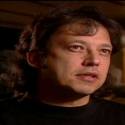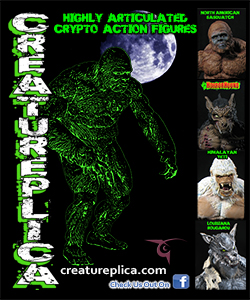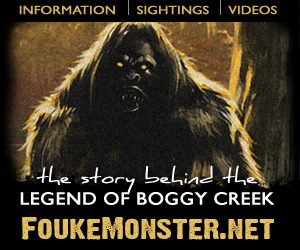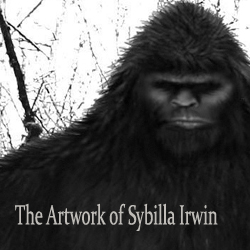Searching for Sasquatch
Posted by: John Kirk on September 27th, 2014
I’m not totally sure how I feeel about this article on my organization the BCSCC in today’s Globe and Mail.
We encourage frredom of thought and critical thinking. For instance I respectfully disagree with my colleague who attributes woodknocks and howls to sasquatch. I personally find these can be explained by other sources than sasquatch.
Readers can make their owns, by reading the article here:
Searching for Sasquatch: One club’s 25-year quest around a B.C. resort town
Every few weeks, members of the B.C. Scientific Cryptozoology Club head into the wooded hills around this resort town – pins on their backpacks reading “Sasquatch research” – looking for proof of something that few people think is there.
For a quarter century, the club’s hobbyists, scientists and other laymen have passed through Harrison Hot Springs and continued the search they have mounted for longer than any other group in Canada.
In the village, they’ve found a local population that has embraced the mystical creature said to be living in the dark hills around the fjords that ring Harrison Lake. Statues of angry gorilla-like creatures and grandfatherly apes dot the town, linked by painted footprints and colourful kitsch.
The club’s members walk through thick moss on the unorthodox quest of cryptozoology, looking for animals that remain hidden. At the top of their wish list: the Sasquatch – better known as Big Foot in the United States. A centerpiece of First Nations lore, the Sasquatch’s likeness has been captured by centuries of masks, totem poles and stories.
While their choice of hobby might raise eyebrows, the club’s members are a skeptical lot. When sightings are reported, a researcher is dispatched often within hours. Instead of rifles, they pack cameras, notebooks and plaster to make castings of any footprints they might run across. The scientific method is at the centre of their thinking and they roll their eyes at the paranormal.
Adam McGirr has been with the club for most of its existence, joining when he was 14 years old. For more than a decade, he has taken any opportunity to make the two-hour drive from Vancouver to Harrison Hot Springs.
The search for Sasquatch has been “an all-consuming hobby,” says Mr. McGirr, ruining a number of marriages in the club. While BCSCC members would be overjoyed to capture a Sasquatch on video and have it authenticated, he says they would be equally pleased proving Sasquatch to be one of the greatest hoaxes of the past century.
The Sasquatch is said to make “blood-curdling” howls, according to Mr. McGirr. Wood knocking is believed to be the main way the creatures communicate over long distances. Large pieces of wood, the size of century-old trunks, are hit against towering trees. There is a belief that the creatures would be omnivores, much like the mountain gorilla.
Mr. McGirr has never seen a Sasquatch. But he’s worked with people like Bill Miller, who operates an outdoor adventure company in Harrison Hot Springs. Mr. Miller considers himself a Sasquatch hunter and says he’s come across the creature twice.
“A large biped ran by where I was fishing one night, I got enough of a view of it in the dark to see it go by,” Mr. Miller says of his first sighting in northern Minnesota in 1980. “I had no idea what it was at the time; I figured it was one big son of a gun.”
At the time, Mr. Miller says all he had seen was the famous Patterson-Gimlin film. Shot in northern California in October, 1967, the film depicts a female Bigfoot walking with a strange gait along a creek bed.
After decades, the shaky footage remains at the centre of Sasquatch lore and stands as the Sasquatch version of the Zapruder film of the John F. Kennedy assassination; it can be neither verified nor disproved.
Mr. Miller’s second sighting was in 2003 near Harrison Hot Springs – the Mecca of Sasquatch sightings, he says. While he was travelling up a mountain, he spotted a dark shape on a neighbouring peak and eyed it through a looking glass.
“I saw it and it shocked the hell out of me,” he says. “It was cinnamon brown, it was what I expected I guess. It was like the Patterson creature, just bigger across the shoulders and back.”
Echoing many other sighting stories, Mr. Miller says he became overcome with fear. “I don’t go around admitting this, but that day I understood the fear people have. I felt very small all of a sudden.”
The B.C. club knows its odds are poor for finding hard evidence of a Sasquatch – despite the reported sightings, no bones, fur or scat has ever been found.
While they have faced setbacks and uncomfortable questions, searching will remain a hobby for people who spend their lives as bureaucrats, contractors and nightwatchmen. During their weekends, they will continue to study textbooks and refine their collection methods as citizen-scientists.
The grandfather of all Sasquatch research is John Green, an 88-year-old former mayor of Harrison Hot Springs and former journalist whose extensive collection of prints and research could form the central exhibit of a Sasquatch museum.
Mr. Green’s disciples are working with town officials to open a museum by next year.
Mr. McGirr says working the front desk of that museum would be his dream job.
Left on disability after winning a fight with Hodgkin’s lymphoma, Mr. Miller moved to Harrison Hot Springs never intending to devote his life to following Sasquatches in the woods.
Article above is excerpted from: The Globe and Mail
About John Kirk
One of the founders of the BCSCC, John Kirk has enjoyed a varied and exciting career path. Both a print and broadcast journalist, John Kirk has in recent years been at the forefront of much of the BCSCC’s expeditions, investigations and publishing. John has been particularly interested in the phenomenon of unknown aquatic cryptids around the world and is the author of In the Domain of the Lake Monsters (Key Porter Books, 1998).
In addition to his interest in freshwater cryptids, John has been keenly interested in investigating the possible existence of sasquatch and other bipedal hominids of the world, and in particular, the Yeren of China. John is also chairman of the Crypto Safari organization, which specializes in sending teams of investigators to remote parts of the world to search for animals as yet unidentified by science. John travelled with a Crypto Safari team to Cameroon and northern Republic of Congo to interview witnesses among the Baka pygmies and Bantu bushmen who have sighted a large unknown animal that bears more than a superficial resemblance to a dinosaur.
Since 1996, John Kirk has been editor and publisher of the BCSCC Quarterly which is the flagship publication of the BCSCC. In demand at conferences, seminars, lectures and on television and radio programs, John has spoken all over North America and has appeared in programs on NBC, ABC, CBS, PBS, TLC, Discovery, CBC, CTV and the BBC.
In his personal life John spends much time studying the histories of Scottish Clans and is himself the president of the Clan Kirk Society. John is also an avid soccer enthusiast and player.










The Globe and Mail section reads like a high school paper. Disjointed in spots and makes unsubstantiated claims.